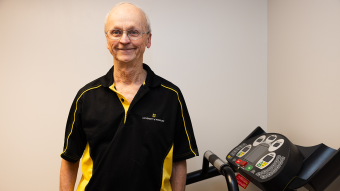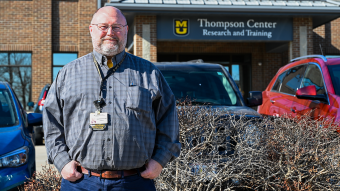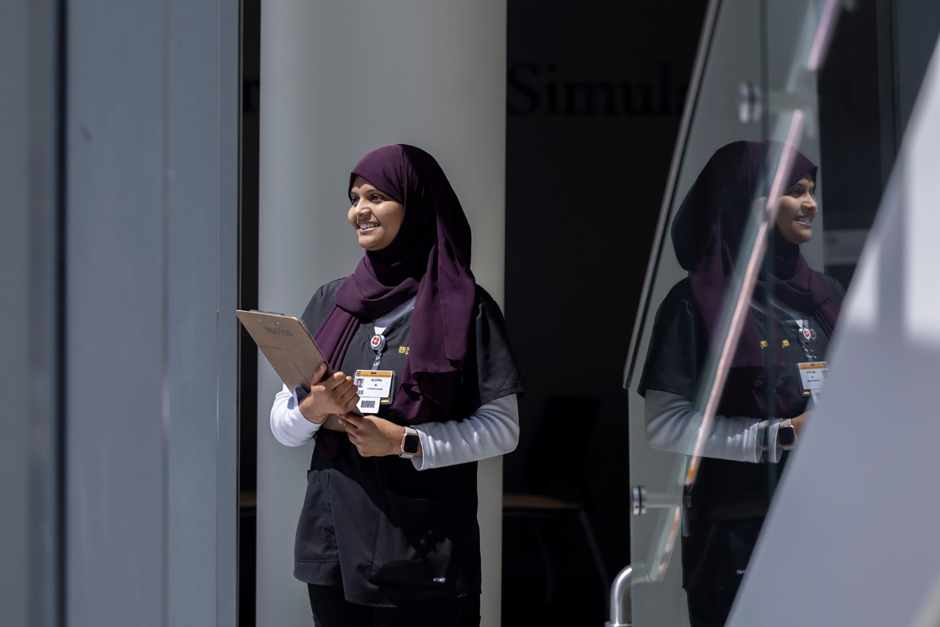
Sept. 5, 2024
Contact: Brian Consiglio, consigliob@missouri.edu
Photos by Sam O’Keefe
Nurse assistants are the unsung heroes of the health care industry. Their crucial yet often behind-the-scenes work allows registered nurses (RNs), who have more advanced training and can perform a wider range of medical tasks, to focus on care only they can provide.
Nurse assistants work closely with patients — monitoring vital signs, assisting with personal hygiene, moving patients around the hospital and more. For someone new to the field, these tasks can often prove stressful. But when University of Missouri junior Alvira Nishat became an MU Health Care nursing assistant in 2023, she entered the job with confidence.
And it’s all thanks to courses she took at the MU Sinclair School of Nursing.
Earn while you learn
Nishat, a nursing major, was one of 33 students selected for the first cohort of the Unlicensed Assistive Personnel (UAP) course. The three-hour, semester-long class is the result of an $800,000 grant from the Missouri Department of Economic Development. The grant has three primary missions:
- provide Mizzou students with real-world experience working as nurse assistants.
- address severe nursing staffing shortages that are impacting the health care industry.
- discover if nursing is a career path they are interested in pursuing.
Students begin the course in the nursing school’s simulation lab brushing up on their skills and then are paid by MU Health Care to complete their clinical hours toward their certification.
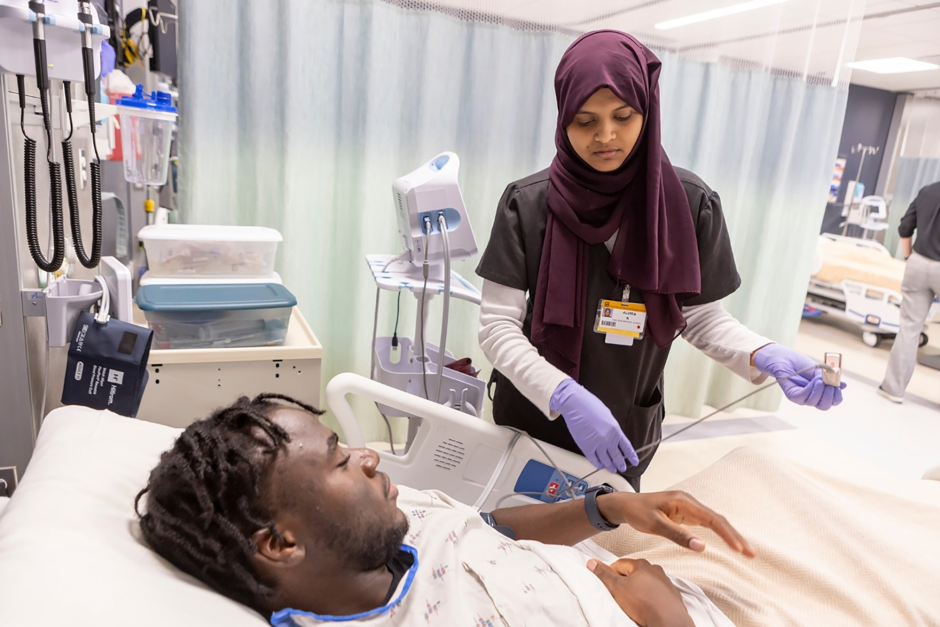
The UAP course is taught by Nicole Bartow, a former perinatal nurse at MU Health Care and one of only a handful of Missourians who is officially certified as a health care simulation expert.
The National Center for Education Statistics reports that 40% of college students work 10-35 hours per week. With this UAP program, Mizzou students can work in a field they are interested in pursuing a career in, build their resume and ease a critical workforce shortage all at the same time.
“This program is groundbreaking for the state of Missouri,” Bartow said. “There are large vacancies for both registered nurses and nurse assistants, and having more trained assistants eases the burden on overworked RNs who have been struggling with burnout, especially since the COVID-19 pandemic.”
The program is just one way Mizzou offers students hands-on learning opportunities, a philosophy known as the Missouri Method.
Bartow’s favorite part of her job is teaching students and helping prepare them to succeed in the workforce.
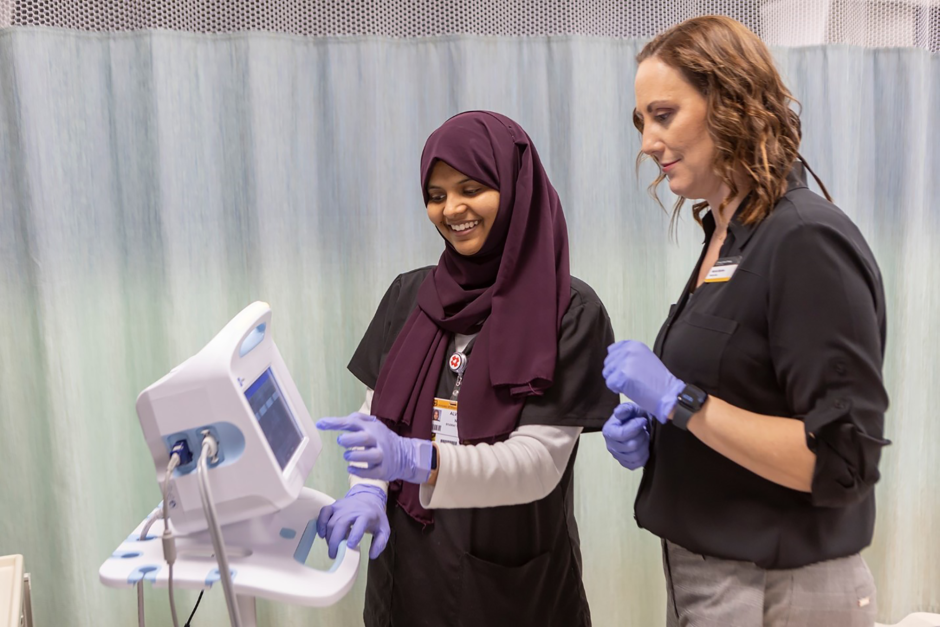
“Alvira’s caring nature will make her a fantastic nurse, as I have noticed if someone else in class is struggling with something, she will come right alongside them and help them,” Bartow said.
In addition to the coursework, MU Health Care provides clinical care experiences and pays each student to complete the clinical hours required for certification. After completing coursework and clinical hours, students can sit for an exam to receive a certified nursing assistant certificate.
A stepping stone to success
Nishat, who grew up in India and has long dreamed of being a nurse, said the experience only solidified her desire to pursue the career.
“Thanks to this program, so many doors were opened for me, and I gained so much confidence in myself and my decision-making,” she said. “The hands-on learning experiences helped me boost my resume, get into nursing school and learn more about what career path in the nursing industry I want to pursue in the future.”
Nishat said the program is not only helping nurses, patients and the health care industry, it also helped her own educational journey.
“It was a very rewarding experience, as I got a first-hand look at seeing how busy nurses are, and I got to help them ensure the patients received the care and attention they need,” Nishat said. “This program helped confirm my desire to become a nurse.”
In just a year, the program has already been a success. Nishat and her 32 peers from the program’s initial cohort decided to stay on as MU Health Care employees. More than 125 students applied for the second cohort of the program, and the program can serve as a model nationwide.
Just getting started
The three-year grant started in fall 2023 and runs until 2026, with the goal of training approximately 300 Mizzou students.“The first cohort of 33 students worked for a total of 5,000 hours in University Hospital during fall 2023. They helped our frontline teams tremendously by augmenting our workforce and providing direct patient care,” said Shanon Fucik, chief nursing officer of MU Health Care. “The clinical experiences that they are getting will be invaluable, and hopefully many of the students consider MU Health Care as a potential employer after graduation.”
Another cohort of 40 Mizzou students were taught by Bartow last spring, and more Mizzou students are enrolled in her class this fall.